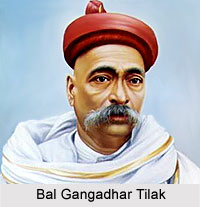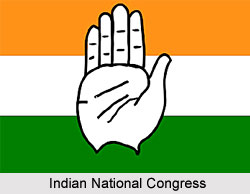 Bal Gangadhar Tilak was an outstanding leader of the Indian national movement scholar and thinker. In fact Tilak had been intimately associated with the Indian freedom struggle. From the period of 1870 to the beginning of 1920, Tilak`s association with the Indian national movement could be divided into three phases. The first stage commenced from about 1879-80 AD, the second stage from 1891-97and the third stage from1905-08. Tilak`s role in the Indian National Movement brought forward important developments. Though he began his fight on the Maratha soil yet his activities crossed the threshold Maharashtra.
Bal Gangadhar Tilak was an outstanding leader of the Indian national movement scholar and thinker. In fact Tilak had been intimately associated with the Indian freedom struggle. From the period of 1870 to the beginning of 1920, Tilak`s association with the Indian national movement could be divided into three phases. The first stage commenced from about 1879-80 AD, the second stage from 1891-97and the third stage from1905-08. Tilak`s role in the Indian National Movement brought forward important developments. Though he began his fight on the Maratha soil yet his activities crossed the threshold Maharashtra.
The first stage in Tilak`s role in the Indian National Movement extended over a period of 10 years. It was during these years that his radical political views and outlook was moulded. With the help of several colleagues, Tilak launched number educational undertakings in a private Secondary School that was independent of British official institutions, the Deccan Education Society and a college. At the same time in collaboration with some of the Maratha patriots, Tilak started two weekly newspapers the Mahratta and the Kesari. However during 1890s he had differences of opinion with his colleagues and as a result Tilak withdrew from the Deccan Education Society. Thus, the first stage is identified by Tilak combining broad educational work with political propaganda.
In the second stage of his career, the differences of opinion between Bal Gangadhar Tilak and the Maharashtra Moderate Nationalists widened. In the Sarvajanik Sabha, the difference was out in the open too. In 1895, Tilak succeeded in ousting the Moderates from the society and becoming its actual leader. He then moved forward to active political struggle against the colonial regime, to widely applying means and methods designed to enlist the masses into the struggle. In 1895 the Maharashtra Nationalists` radical wing came into being as a result of the breaking of the native political society in the then Deccan. Subsequently in 1897 with the aggravation of the political situation in Western India, culminated in Tilak`s arrest and his being sentenced to 18 months` imprisonment.
This ushered in the third stage of Tilak`s career. In the period of the 1905-08 revolutionary upsurge Tilak became the chief leader of the democrat tic wing of the national movement not only of Maharashtra but of the whole of India. Likewise covering ten years, 1898-1908, the third stage terminated in another trial of Tilak, his being sentenced to transportation, and a great revolutionary spurt of the masses of Mumbai who elevated the struggle for India`s liberation to a new and higher plane.
 From 1879 and 1897 Tilak`s patriotic activity proceeded mainly in his native Maharashtra and was, therefore, of a local character to some extent. This time period was marked by number of important developments. The British had turned India into a source to obtain raw materials for British industry. Then it was also made a field for the export of British capital. The peasantry, which prised the overwhelming majority of the population, grew increasingly dependent on merchants and moneylenders and sank into poverty. At the same time a process of Indian native capitalist development with the formation of a working class and indigenous bourgeoisie class emerged alongwith the growth of an intelligentsia. The young liberal bourgeoisie, considering India as a whole to be the Sphere of its trading, money-lending and enterprising activity crossed the national barriers dividing the peoples of India, overcame religious and caste prejudices, and, in 1885, founded the Indian National Congress, the first political organisation claiming all-India leadership.
From 1879 and 1897 Tilak`s patriotic activity proceeded mainly in his native Maharashtra and was, therefore, of a local character to some extent. This time period was marked by number of important developments. The British had turned India into a source to obtain raw materials for British industry. Then it was also made a field for the export of British capital. The peasantry, which prised the overwhelming majority of the population, grew increasingly dependent on merchants and moneylenders and sank into poverty. At the same time a process of Indian native capitalist development with the formation of a working class and indigenous bourgeoisie class emerged alongwith the growth of an intelligentsia. The young liberal bourgeoisie, considering India as a whole to be the Sphere of its trading, money-lending and enterprising activity crossed the national barriers dividing the peoples of India, overcame religious and caste prejudices, and, in 1885, founded the Indian National Congress, the first political organisation claiming all-India leadership.
As far as Tilak was concerned, he readily helped the Indian bourgeois opposition to pursue its quite modest programme of struggle for the institution of the so-called representative principle in the administration or India. He was well aware that this programme was only a half way measure. It was permeated with the idea of compromise with the colonial power and that a very narrow circle or people could gain from it but a semblance of benefit. Nevertheless he conscientiously helped to promote its realisation. Being proud of his Maratha origin and culture, Tilak was even ready to forego his Maratha nationalism in the interests of the whole Indian bourgeois class which he regarded as the interests of the people of India.






